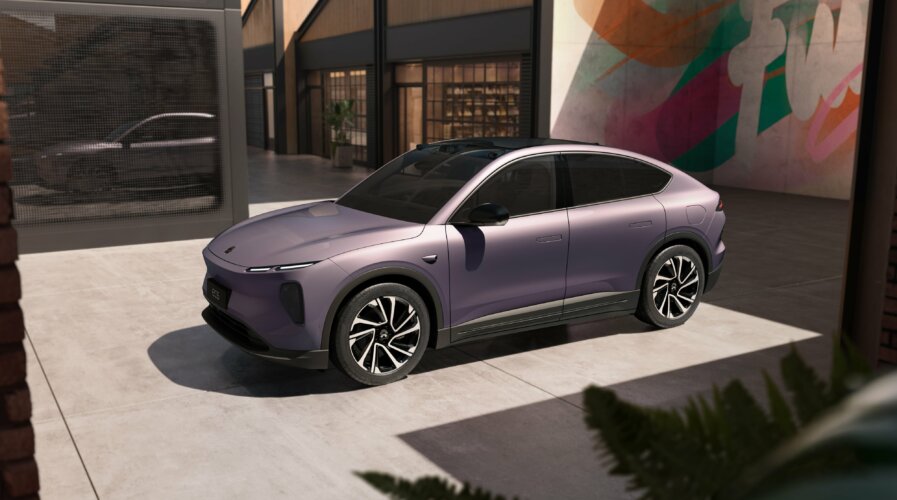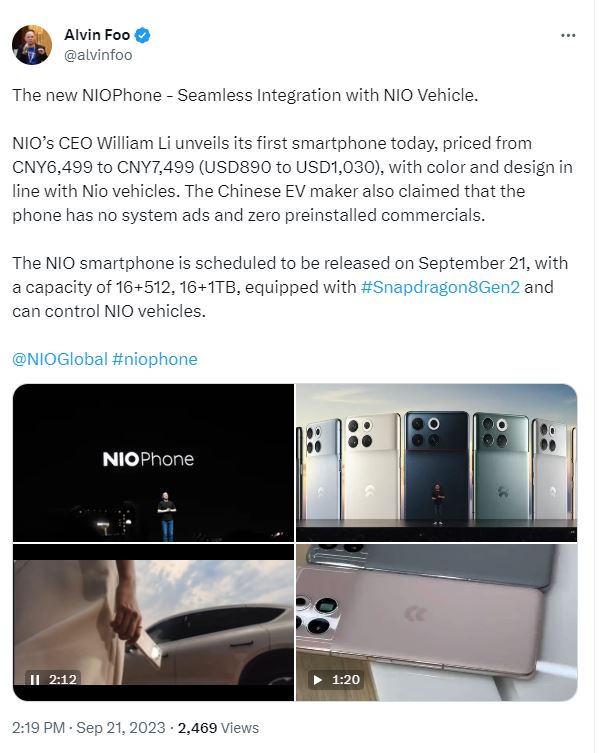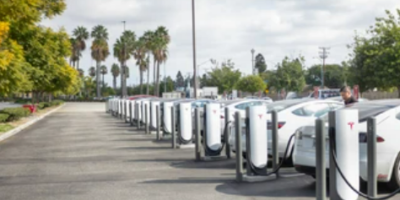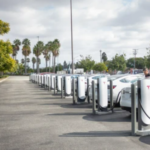
Nio launched a smartphone that can control its vehicles. (Image – Nio)
Chinese electric cars can now be controlled with smartphones
- Chinese electric car maker Nio unveils a smartphone that can control cars.
- Drivers can use smartphones to park their cars and even drive to their location.
- Other Chinese electric vehicle manufacturers are also looking at similar innovations.
In the 1997 James Bond film Tomorrow Never Dies, Q gives Bond a BMW 750iL and an Ericsson mobile phone to control the car. Excited by the technology, Bond test drives the car with the mobile phone and even uses it to control the vehicle as he escapes from the bad guys.
Audiences were amazed by the capabilities of Bond’s mobile phone, which many felt would never be possible. Ironically, just as mobile phone cameras were only a thing of Hollywood trickery initially, cars controlled by smartphones are now becoming a reality.
Chinese electric car automaker Nio has unveiled a smartphone capable of controlling their vehicles. According to a report by Reuters, the high-end smartphone by Nio is designed to be used with its electric cars. The Nio Phone is the first car-specific phone sold by the Chinese electric car company.
The smartphone, unveiled at Nio’s tech event, can perform various functions, such as instructing the vehicle to park. Drivers can also use the smartphone to instruct the car to drive itself to their location and unlock the car even when the smartphone is switched off. In fact, the smartphone has more than 30 car-specific functions.
The South China Morning Post also reported that the Android-based smartphone is priced at US$890 and is compatible with all eight of the Chinese automaker’s electric vehicle models. The smartphone is made by Lens Technology, which is also a supplier of smartphone lenses to Apple.
Nio’s Chief Executive William Li said that the company had broken new ground with connection technologies and that he believes their competitors will learn from their smartphone innovations, a move which he welcomes.
Chinese electric cars continue to innovate
The Nio Smartphone may be the world’s first mobile device to control a smart car, but it is not the only one. Reports show that other Chinese electric vehicle manufacturers are also working on mobile devices linked to vehicle innovations.
For example, Geely’s electric vehicle company, Polestar, announced plans to launch its smartphone in China in December. The smartphone could showcase similar features to the Nio Smartphone.
Meanwhile, Xiaomi, another smartphone vendor, is already working on its electric vehicle with plans to debut next year. The Chinese tech company recently received approval from regulators to build the car.
In the US, the Apple Car is also being developed for a 2024 release. While there have been many rumors that the car will be a self-driving electric vehicle capable of competing with Tesla, Apple could also partner with other vehicle manufacturers in the development. However, it remains to be seen if users will eventually get to use their iPhones to control their vehicle when it debuts.
Sony is also in a joint mobility venture with Honda to produce their electric car, which could go on sale in North America in 2026. A prototype called Afeela was unveiled at CES in Las Vegas earlier this year. There have been rumors that the smart car could feature Sony’s trademark gaming features, such as an inbuilt PlayStation console.
And then, of course, there is Tesla. Elon Musk will undoubtedly want to find ways to offer similar features to the emerging models – and probably more. Tesla initally had the Summon feature, which work similar to Nio’s smartphone on an app. However, the feature has since been disabled as Tesla looks to perfect it. As such, the world awaits the debut of the much-rumored Tesla Phone.

The Nio smartphone is launched on a waiting world.
The state of China’s electric vehicle industry
Chinese electric vehicles are becoming increasingly popular, not just in China but globally as well. Statistics show that a third of cars in China are now electric, as the number of EV manufacturers in the country grows and the affordability of the vehicles drives adoption.
China is the world’s largest new energy vehicle (NEV) market. According to the Ministry of Public Security, NEV ownership in China reached 13.1 million by the end of 2022, showcasing a substantial increase of 5.26 million vehicles (a remarkable growth rate of 67.13%) compared to 2021. Electric cars accounted for 79.78% of this vast NEV fleet at 10.45 million.
The self-driving vehicle industry in China is also picking up pace, with several Chinese cities already having the service available. More tech companies and startups are also focused on developing the technology and contributing to more use cases in the industry.
Reuters also reported that Europe is a crucial export market for Chinese electric vehicle manufacturers. This is driven by Europe’s strict emission rules and Beijing’s relatively benign trade ties. In the first seven months of 2023, Chinese NEW shipments to the European Union jumped 112%. The European Commission also believes that the number of Chinese electric vehicles sold in the region could grow by 15% by 2025.
The European Commission also launched an investigation into whether to impose punitive tariffs to protect European Union producers against cheaper Chinese electric vehicle imports it says are benefiting from state subsidies.
READ MORE
- 3 Steps to Successfully Automate Copilot for Microsoft 365 Implementation
- Trustworthy AI – the Promise of Enterprise-Friendly Generative Machine Learning with Dell and NVIDIA
- Strategies for Democratizing GenAI
- The criticality of endpoint management in cybersecurity and operations
- Ethical AI: The renewed importance of safeguarding data and customer privacy in Generative AI applications






